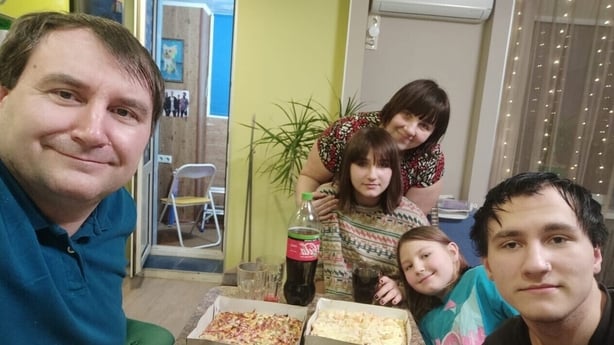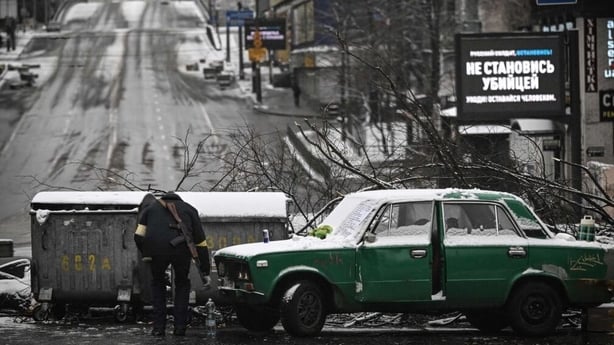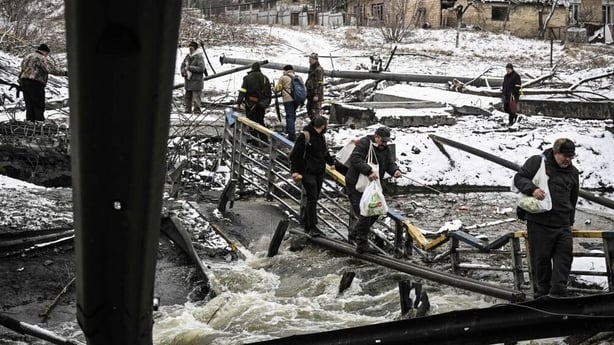As the Russian advance into Ukraine continues, many people in a number of Ukrainian cities have been forced to take shelter in basements and underground.
For those who stayed in Ukraine's second city of Kharkiv, a lot has changed in a week.
"I'm sure God is going to take care of us and we will be ok."
The hopeful words of Luda Sviridok speaking this afternoon from inside the thick walls of a room with no windows.
The 47 year old and her family have taken refuge in a church building in Kharkiv, believing it to be safer than their 7th floor apartment.

The church had been undergoing renovations in recent months.
"We were hoping to have a wonderful place for worship and now it has become a refuge," she said.
"It's really unsafe to be outside. The shelling is going on every day and at night. It stops for a short time like half an hour or an hour and starts again.
"There was shelling and bombing of some residential areas yesterday. It's really scary. People were injured, some people died, houses were destroyed," she said.
Luda had not planned to leave Kharkiv in the north east of Ukraine, but as Russian shelling of the city intensified overnight, Luda has changed her mind.
She is now trying to leave the city with her two daughters, while her husband, a church pastor, and 19-year-old son will remain in Kharkiv.
They will stay to look after Luda's parents who are aged in their 80s, and to look after the church.
"I have very senior parents who live here. We don't want to move anywhere, but in light of the shelling at night and this morning we are looking for an opportunity to evacuate."
Luda is hoping that her route out will be on what she called an "evacuation train" organised over social media and is currently waiting for word on when it will leave and where it will travel to.
But fake news and misinformation means she does not know if the offer of evacuation is genuine.
"There is information about an evacuation train. But there is a lot of information about fake groups. We have no information where its leaving, so it might be fake.
"If it is fake then we don't know, we don't have any other ways to get out," she said.
Luda said it's extremely hard to get on trains as people are "literally storming trains" to be able to take their kids to safety.
"I would stay and help my husband in the things he's doing, but I want to take my kids to safety, because there has been more and more shelling and bombing and that's really scary," she said.
Luda said that the Russian invasion has been bewildering and that she never expected the neighbours to carry out what she called an atrocious act.
She said she would like Russian people to see the true situation and understand what is happening in Ukraine.
More than 200 kilometers from Kharkiv, Irish medical student Racheal Diayolu is stranded in the city of Sumy.
Getting home to her family in Carlow is all the 19-year-old can think about.
"You wake up every day hoping that there is going to be an update that I can get home or that there's a way they can make it safe for us to travel and get back home."
She started university there last November and is currently in student accommodation in the city, where she has been rushed to a bomb shelter in the building several times since the Russian invasion began last Thursday.

"We've been told the night time is the most dangerous and we have been given a curfew as well from 6pm to 6am.
"You stay inside, you make sure you're with people and if you do go outside you tell people where you're going. You just never know what could happen and you could be called to the bunker at any time of day," she said.
"Since Thursday we've been down there five times. It's a very dark place, it's underground, there's two different sectioned off areas.
"The floor is sand and concrete, there's no cell connection or internet and it's quite cold. You just have to sit there and wait until it's safe to go up," Racheal said.
Because of her studies, she said she wasn't in a position to leave the country when the travel advice for Irish citizens to leave was first updated.
She has been in contact with the Department of Foreign Affairs.
"They told me that the best thing to do at the moment is to stay put, and that they will help if they can, if they know of any evacuation routes that are going ahead, they'll let me know," she said.
In a statement this evening, the Department of Foreign Affairs said it is aware of Racheal's case and that consular assistance is being provided.
"That's all that's on my mind. Just hoping to get home. I know it's so difficult on my family. I'm over here and there's virtually nothing they can do to get me back."
"It's all I can think about, just hoping to get home safely at some point, and hug my mam, hug my family members, I haven't seen them for such a long time, so obviously in circumstances like this, they're all I want to see."
Luda and Racheal's stories are not unique.
Hundreds of thousands of civilians in Ukraine have already fled to the borders, seeking safety.
But as Russian attacks on the country's cities intensify, it is becoming more difficult and more dangerous for people get out.
"These are the uncertainties and the incredibly difficult dilemmas that civilians across the country, millions of them, are faced with," says freelance journalist Jack Losh who is reporting from Ukraine.
"Do they take to the road, what are they going to find on the road, are they going to be attacked, what are they going to find at checkpoints, are they going to be able to get across the border?
"If they stay, are they going to be killed by Russia's increasingly intensifying artillery attacks. These are unimaginable choices that millions of ordinary people are now being confronted with on a daily basis," he said.
Jack Losh is currently in Dnipro but had been in Kharkiv for almost two weeks and had been living just a few hundred meters from the city's administrative building, that was hit by a missile strike today.
He said that people were concerned that there would be some sort of siege or intensification of bombardment, but he said he didn't think people expected the levels of what he described as "indiscriminate extreme violence".
Meanwhile, Dmytro Chaika who has stayed behind in Kyiv told RTÉ News that: "We spend our nights in a shelter, because there is usually heavy shelling at night.
"We try to convert all our fear into the anger and the willingness to fight. You hear some very depressing news. Some people are dying, like friends of friends.
"But still, we don't lose our faith."
A week ago, Mr Chaika was working as a film producer. Now, he has set up a makeshift office in his corridor and is working remotely helping with the medical supply chain.
"I don't think I will carry a weapon in my hands," he said.
"I can do way more helping - or harm to the aggressor - with my laptop than with a gun."

For the first night in days, Darii spent last night at home instead of in the shelter.
"I slept almost in bed," she said. "We put a mattress in the bathroom to be safer, so it was better than the night before."
Despite a number of offers to help her leave, she chose to stay.
"I had six possibilities to go but I decided to stay to help," she said, explaining that she is now trying to adapt to her new reality.
"The first day was kind of scary, the next days are just super mad."
Mariia Kriuchock also stayed in Kyiv.
"I was born here, me and my boyfriend are here, my cat is here, my mom here, my whole family, my grandparents and I do not want to give up on my city," she said.
"We are very tired, but we are also very united.
"It is very important to know that the world is with you - the world is standing with Ukraine."

Ms Kriuchock said there are troops and tanks all around Kyiv.
"This is our new reality," she said. "We are trying to live this day to fight for our country, today and hope that we will do this tomorrow and the day after."
She said that just a week ago she was planning her holidays and wondering who would mind her pet kitten.
"This is a total madness that we are living right now," she said. "Outside my windows technically I see the kindergarten, but there are no kids there."
Ms Kriuchock said there are no lights in the apartments and houses and night and only a few people remain.
She said they are trying to get out for small walks every day.
"There are people because there are lines for the shops and lines for the pharmacy," she said.
"But again, there are also a lot of territorial defence people. People are trying to communicate and share what's going on, but it's hard.
"It's something that we are still coping with."
Meanwhile, the Department of Foreign Affairs has said that it remains in ongoing contact with registered Irish citizens in Ukraine, currently totalling 67.
It said that it strongly advises against travelling to Ukraine for any reason.
We need your consent to load this rte-player contentWe use rte-player to manage extra content that can set cookies on your device and collect data about your activity. Please review their details and accept them to load the content.Manage Preferences
Additional reporting Helen Donohue







